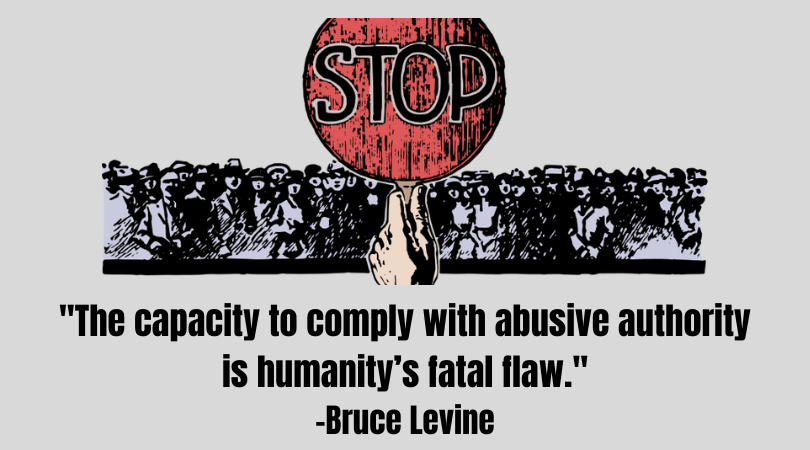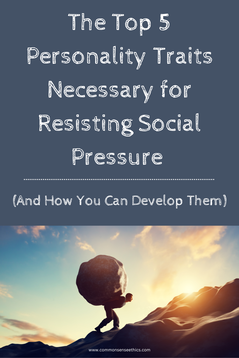Many of us are inclined to follow the majority or yield to social pressure because of our evolutionary biology. When our ancestors lived in tribes, we learned various skills by watching others and there were significant risks to our survival for being ostracized from the group. While there are fewer risks to our survival for not conforming with the majority today, there are still risks of being ostracized socially when we disagree. There are also psychological factors at work. People conform because they want to be right, because they want to be liked, or at the very least, because they don't want to seem eccentric or strange.
The ability to resist social pressure is quite important, because it determines what we will do in many contexts and how much backbone we have. While there may be some social drawbacks to resisting peer pressure, there are many benefits as well, such as not always seeking other's approval, thinking more openly, standing up for yourself in situations that matter, living a more authentic life, avoiding potential harm, and perhaps having more opportunities or career success.
Some people naturally have personality traits that make them more resistant to social pressure, but anyone can develop these traits with practice. Here, I'll discuss the stop 5 traits of peer pressure resistant people and how you can develop these traits:
1. Mental Toughness
The good news is that courage is easy to develop little by little over time. First, think about what it is you fear if you speak up against some majority opinion. Imagine the worst case scenario and how you would react. Usually the worst doesn't even happen and your fear is basically a non-issue.
Each time you overcome your fear or put yourself out there in some way, you develop more courage.
2. Contrarianism
My own view is that being contrary about everything as a rule will make you quite a difficult person to be around. However, true contrarians are pragmatic, not people who hold their opinions just for the sake of rebellion. They are contrarian about things that really matter to them. Contrarianism can be a helpful trait when the group is wrong, when your values differ from those of the group, when you want to look for opportunities the majority don't see, and/or when going along with social pressure will impact you as an individual negatively in some way.
Contrarians realize they risk social isolation because of their differing viewpoints. They are usually comfortable embracing this risk anyway when the circumstances necessitate it. So, this trait goes right along with trait number 1, courage or mental toughness. Contrarians have courage in certain situations and are comfortable resisting social pressure when it benefits them as individuals.
To become more contrarian and get better at resisting peer pressure, ask yourself "What can I do differently in this situation which may benefit me?" or "Is this right for me just because it is right for the majority?"
3. Critical Thinking
Critical thinking is difficult to define, but it is basically the ability to periodically question your own assumptions and to make sure your are thinking clearly and reasonably about something. I've been interviewed about critical thinking and also done a video interview on critical thinking here. Here is a longer definition of critical thinking from that interview:
When I say critical thinking, strictly, I'm referring to logic, or the science of how arguments need to be formed in order to be correct. I'm also referring more generally to skills like being slow to form opinions, having standards of evidence, separating truth from falsehood, being able to accurately evaluate other people's arguments, being open-minded, not being afraid to be wrong, changing your mind in light of better information, and thinking with a degree of detachment (rather than from a dogmatic or emotionally driven mindset). I would also add to this a working knowledge of cognitive bias and group dynamics. All these things are helpful for being able to think more clearly.
It also doesn't hurt to have a good understanding of propaganda and how it is used to influence us, so check out my article on that as well to bolster your critical thinking ability.
4. Disagreeableness
Research indicates that people who are higher in disagreeableness may be more successful in their careers, particularly when it comes to moving up the corporate ladder to an upper management position. While this isn't everyone's goal (and in my mind isn't a particular marker of "success," either) being disagreeable can have other advantages too.
People are less likely to pressure a disagreeable person because they know that person probably won't change their mind. Disagreeable people may also give you an earful if you push them too far.
Note that I'm thinking less about being peer pressured to do innocuous things like "You should see x new movie, it's really great." I'm thinking of more troubling forms of social pressure, as it relates to medical decisions for instance: "You should really take this new drug x that everyone must have," (regardless of your unique medical history or other valid reasons you may not want or need new drug x). No matter the situation, a more disagreeable person is less likely to comply.
It's important to note that being somewhat disagreeable doesn't mean you should try to get into conflicts. It does mean that you aren't afraid to assert yourself when someone crosses the line however. Ideally, you should work on your delivery so that you are tactful yet assertive when standing up for yourself or when giving criticism.
If you are a very agreeable person, you can develop a little more backbone by saying no or standing up for yourself in an assertive yet tactful way. In the beginning, this might be uncomfortable, but you will get used to it more over time. It can help to rehearse important conversations ahead of time and think about what you want to say in a given situation.
5. Healthy Skepticism for Authority
I want to be clear that I don't think that all authority is inherently negative - authorities can be good, bad, neutral, or anywhere along that continuum. And obviously I'm not talking about situations where questioning authority would put you in harm's way either. If a cop tells you "Put your hands up or I'll shoot," you had better do it.
However their are many circumstances where we should not cede our critical thinking ability to an authority or expert without due consideration. Can we find other experts or authorities who disagree with the first authority? What if an authority or expert is mistaken? What if they have a conflict of interest? What if an expert or authority has proven themselves to be untrustworthy and has a poor track record? All of these things should be in our mind when we consider which authorities we can trust.
Psychologist Bruce Levine writes that the capacity to comply with abusive authority is humanity’s fatal flaw. An abusive authority is one which has shown itself to be dishonest or malevolent in some way. To overcome this flaw and develop a healthy skepticism of authority, we can get into the habit of asking ourselves the questions above.
I hope that this post will help you flex your contrarian muscle more and resist social pressure when it matters. Thanks for reading!
~
Read Next:
How Can We Overcome Our Biases?
How to Change Your Mind
Why You Should Create Your Own Culture to Be Happier











